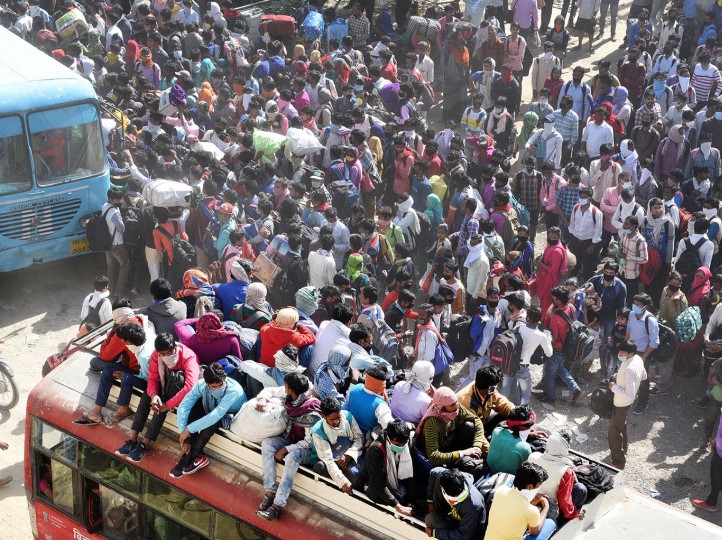As the countries across the globe continue to grapple with the catastrophe of deadly Covid-19 India too is no different and has been under the lockdown for more than a month now. It’s too premature to say anything now as the Covid-19 cases continues to rise steadily in India and the world. I have no dissension with the fact that the economy is revived by living people, not by coffins.
Given its humongous population base with so much complexity and diversity, challenges for India at this juncture is manifold. It’s a herculean task to tame COVID-19 on one hand while ensuring that people don’t suffer from starvation and the economy gets out of its comatose on the other hand. India can’t afford to have a complete lockdown for a much longer period of time, as it may lead to different other problems.
“If winter comes can spring be far behind”
The existing crisis has forced the human race to contemplate a possible world order post-COVID-19. I strongly believe and take inspiration from what the celebrated English Poet Percy Bysshe Shelly wrote in his famous Poem Ode to the West Wind“If winter Comes can Spring be far behind” which in the present context means sufferings from COVID-19 too shall end and there would be a better time for India and the World. Despite living in this moment of despair, it is equally important that we should brace up for the post-COVID-19 world.
India will have to deal with several issues which are multifarious in nature. I hope the pandemic must have opened our eyes and it would do no harm if India starts planning to deal with already existing challenges spanning across various sectors/areas if at all we envision to mitigate the aftermath effects of this existing crisis and also equip ourselves better for the future. Keeping a larger picture in mind we must start brainstorming over different sectors/aspects which requires serious attention.
Naturally, the primary questions that would come up to the fore are where should be our immediate focus? But we don’t need to go too far neither we should get surprised as revisiting our existing policies can provide an answer to such questions. The revival of the economy has become a buzzword these days and rightly so. But we must not pay a deaf ear to several other ancillary sectors and area’s which could potentially contribute to a great deal in maintaining the economic wellbeing of the country. Let us have a look at some of the key sectors which are in the dire need of serious reforms for the coming time.
Healthcare Infrastructure, Medicine and Sanitization
COVID-19 cameo has its lone beneficiary in Masks and Sanitizers which were never given serious consideration in the medical needs of common people. They must have always felt like a stepchild but suddenly became the cynosure of all eyes. Given its dismally poor health infrastructure, barring a handful of government hospitals that too in big cities a mere imagination of going to public/government hospitals elsewhere send shivers down the spine to common people.
Having born and brought up in a small town in Bihar I have myself been a witness and sufferer to its pathetic health infrastructure. Let me remind you that it has been a regular feature for the last few summers when a deadly fever coined as “Chamki” has engulfed as many as 200 innocent children in Bihar and it still continues to do so. I dread what if the COVID-19 or some other pandemic erupts on a much wider scale there in future.
Moreover, a general health and sanitation related awareness camps and drives should be made a regular and mandatory duty of the local government hospitals at village, panchayat and at district level which must be monitored by a local level Civil Surgeon heading those hospitals. It is not a hidden fact that reaching out to big cities or getting treated at private hospitals there are daunting tasks for a large chunk of our population who are living in abject poverty. Besides developing healthcare system in cities strengthening our medical infrastructure at local levels and its strict adherence to guidelines, effective implementation of policies certainly has the potential to pay rich dividends in terms of health, economy and human resources.
Manufacturing & Exports
It would not be an exaggeration to say manufacturing forms the bedrock for exports which is having immense potential of generating capital. But exports to a great extent depends upon the strength of manufacturing in a particular territory. Studies suggest that China has emerged as one of the strongest economies because of its manufacturing capacity. Robust manufacturing not only helps in boosting exports but also gives a new lease of life to the domestic industry and the job market. India can’t afford to remain untouched from the downturn and seismic shifts in the global economy. The economy would certainly need support from all corners. Strengthening our manufacturing could help to a great deal in coping up with the existing crisis and the looming threats of turmoil in the economy.
Agriculture
Often referred to as an Agrarian Economy but thanks to a knowledge gap in farming techniques, irregular rainfalls and inadequate irrigation system India is yet to reap out the optimum benefit out of this sector. Minimum Support Price (MSP) an integral part of India’s agricultural policy certainly intended to help our farmers but that would also require careful consideration with respect to its segment, class of crops and percentage of farmers. Owing to the lack of proper implementation getting MSP benefits are still a distant dream for a large number of farmers. Poor procurement infrastructure in northeast and eastern states like Bihar, West Bengal and Jharkhand also add to the existing woes. Electronic trading portal for agricultural commodities like e-NAM has shown promise as evident from the recent rise in a number of Mandis joining it. But it would be falling short of its intent and objective unless it ensures a deeper penetration mostly into the foray of small farmers for whom it still remains elusive. Similarly, we must ensure that schemes like SMAM benefits the maximum number of farmers. Any policy which takes into account the idea of all-inclusive growth can only serve a greater purpose for the masses. Importance of agriculture goes far beyond its economic benefits as it plays a pivotal role in maintaining our food security which is of utmost importance for any country.
Technology
At the onset of the 4th Industrial Revolution often referred to as Industry 4.0, the use of technology is gaining more and more prominence than ever before. The ongoing COVID-19 saga has made each one of us realize that technological upgradation is something which must be taken very seriously. If India wishes to remain at par with the dynamic global landscape it must focus on upgrading its technologies spanning across various sectors ranging from agriculture, healthcare, city planning, keeping track of its labour force, monitoring economy etc. among several others in the era which is heralded as an age of artificial intelligence. The success of using drones have given a glimpse of how significant impact technology can have on human life. More and more use of drones in future could revolutionize monitoring (which is often humanly difficult in far-flung areas) and delivery mechanism of essential commodities like food and medicines to areas in distress during disasters in our country.
Taking inspiration from the recent regulatory developments like GDPR in European Union, data protection regime in the United States, Japan etc. India must fill the existing gaps in its Data Protection Laws. It is imperative for us to adopt a more concrete approach in creating a robust data protection infrastructure and regulatory regime with the help of technology. It would not only ensure effective delivery of socio-economic welfare schemes linked with Aadhaar but would be immensely helpful in research-oriented activities e.g medical research, identification of areas of concern etc. During this pandemic plight of migrant workers living in different cities has been heart-wrenching. It is a well-recognized fact that the vast majority of the labour force works in the unorganized sector in our country. It’s high time that to leverage their full potential we must ensure the seamless delivery of various existing welfare schemes and also formulate new schemes for them where technology would come in handy. Needless to mention our whole economy, banking system, securities market relies heavily on the use of technology wherein, an updated technology would only enhance their efficiency. The latest example is Zerodha server crash which shows why there is a need for technological upgradation. Digital Currency which is at its nascent stage too has been the talk of the town, which economies across the globe are experimenting with. With the apex court giving it a green signal, we must also explore the feasibility of adopting digital currency effectively into our system in the coming years. Optimizing the use of technology across the sectors would be a win-win situation for the government, business and public at large.
Decentralization
Another cause of concern is the burgeoning population in a handful of Indian cities for which the primary reasons are pretty clear i.e. better job prospects, healthcare, education and the centralization of agencies. Of course, there is no denying to the fact that it would entail huge cost to the exchequer, but sooner or later it has to be done. Therefore, it’s better to start early, chalk out the ways and formulate policies so that in a decade or so we can slowly move on to disperse our population. While COVID-19 is a crisis visible in present but we can’t afford to overlook several hidden crises kept in store for us. One which is quite imminent i.e. Water Crisis waiting to hit us hard probably in not more than a decade. A gradual decentralization or establishment of branches of agencies at different places would go a long way in managing that crisis.
Roads ahead are bumpy and these are certainly not an easy task. It would require serious deliberations with the government, policymakers, stakeholders and public at large. I Would reiterate once again if winter comes can spring be far behind? Let’s hope that we all learn something from the COVID-19 crisis and prepare ourselves better for the future so that India can continue to tread towards its destination of becoming a developed nation.
N.B – Author dedicates this piece to his Grandfather (Nanaji) Mr A.B Dutta who passed away recently.



